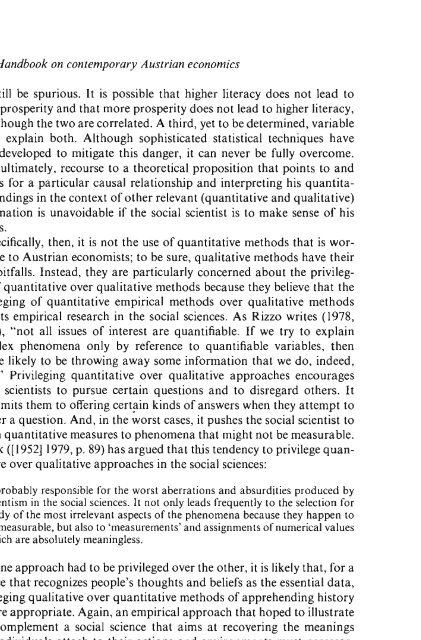Handbook on Contemporary Austrian Economics
Handbook on Contemporary Austrian Economics
Handbook on Contemporary Austrian Economics
Create successful ePaper yourself
Turn your PDF publications into a flip-book with our unique Google optimized e-Paper software.
36 <str<strong>on</strong>g>Handbook</str<strong>on</strong>g> <strong>on</strong> c<strong>on</strong>temporary <strong>Austrian</strong> ec<strong>on</strong>omics<br />
can still be spurious. It is possible that higher literacy does not lead to<br />
more prosperity and that more prosperity does not lead to higher literacy,<br />
even though the two are correlated. A third, yet to be determined, variable<br />
might explain both. Although sophisticated statistical techniques have<br />
been developed to mitigate this danger, it can never be fully overcome.<br />
And, ultimately, recourse to a theoretical propositi<strong>on</strong> that points to and<br />
argues for a particular causal relati<strong>on</strong>ship and interpreting his quantitative<br />
findings in the c<strong>on</strong>text of other relevant (quantitative and qualitative)<br />
informati<strong>on</strong> is unavoidable if the social scientist is to make sense of his<br />
results.<br />
Specifically, then, it is not the use of quantitative methods that is worrisome<br />
to <strong>Austrian</strong> ec<strong>on</strong>omists; to be sure, qualitative methods have their<br />
own pitfalls. Instead, they are particularly c<strong>on</strong>cerned about the privileging<br />
of quantitative over qualitative methods because they believe that the<br />
privileging of quantitative empirical methods over qualitative methods<br />
distorts empirical research in the social sciences. As Rizzo writes (1978,<br />
p. 53), "not all issues of interest are quantifiable. If we try to explain<br />
complex phenomena <strong>on</strong>ly by reference to quantifiable variables, then<br />
we are likely to be throwing away some informati<strong>on</strong> that we do, indeed,<br />
have." Privileging quantitative over qualitative approaches encourages<br />
social scientists to pursue certain questi<strong>on</strong>s and to disregard others. It<br />
also limits them to offering cert~in kinds of answers when they attempt to<br />
answer a questi<strong>on</strong>. And, in the worst cases, it pushes the social scientist to<br />
assign quantitative measures to phenomena that might not be measurable.<br />
Hayek ([ 1952] 1979, p. 89) has argued that this tendency to privilege quantitative<br />
over qualitative approaches in the social sciences:<br />
is probably resp<strong>on</strong>sible for the worst aberrati<strong>on</strong>s and absurdities produced by<br />
scient ism in the social sciences. It not <strong>on</strong>ly leads frequently to the selecti<strong>on</strong> for<br />
study of the most irrelevant aspects of the phenomena because they happen to<br />
be measurable, but also to 'measurements' and assignments of numerical values<br />
which are absolutely meaningless.<br />
If <strong>on</strong>e approach had to be privileged over the other, it is likely that, for a<br />
science that recognizes people's thoughts and beliefs as the essential data,<br />
privileging qualitative over quantitative methods of apprehending history<br />
is more appropriate. Again, an empirical approach that hoped to illustrate<br />
and complement a social science that aims at recovering the meanings<br />
that individuals attach to their acti<strong>on</strong>s and envir<strong>on</strong>ments must necessarily<br />
resemble ethnography and emphasize thick descripti<strong>on</strong>s. Mises ([1957]<br />
1985, p. 280) has argued that "thymological analysis," which tries to discover<br />
how and why people at specific times valued and acted in different<br />
circumstances, "is essential for the study of history." Similarly, Hayek

















